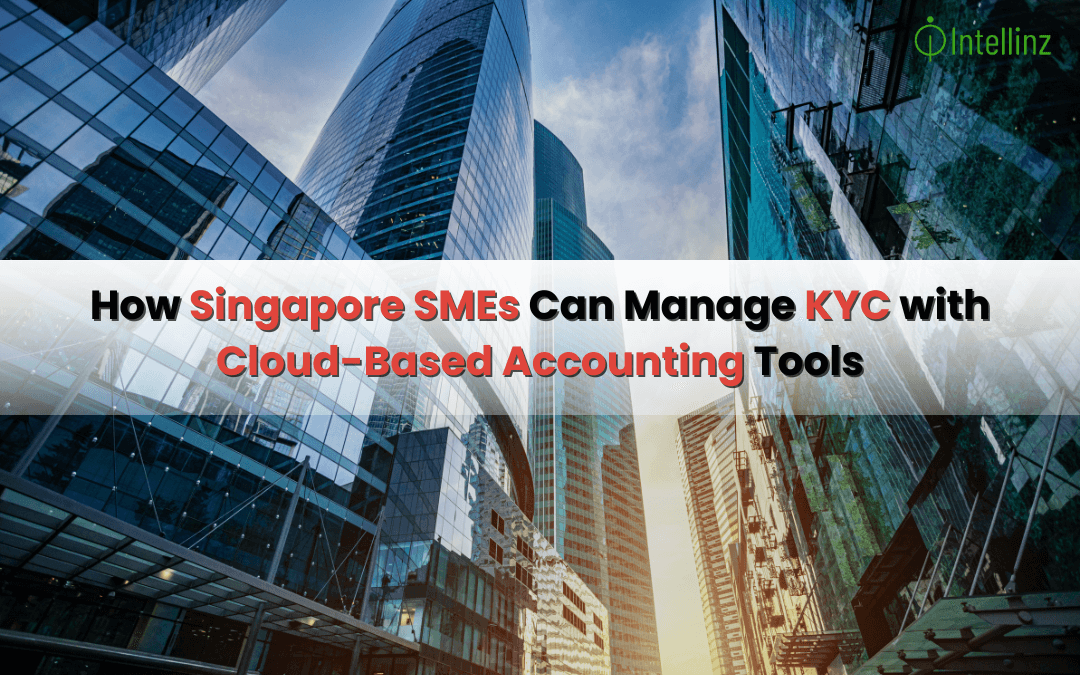KYC solutions are becoming more and more linked with cloud-based accounting platforms, offering a full system for managing financial operations and regulatory compliance. With the help of these tools, SMEs may automate and optimize KYC procedures while maintaining compliance with applicable laws. Cloud accounting solutions can assist Singaporean SMEs in properly managing KYC requirements in a number of ways.
1. Automated Data Collection and Verification
Built-in features in cloud-based accounting software make it easier to gather and validate consumer data. SMEs can automate data entry and integrate with third-party verification providers to minimize the manual labor associated with KYC. Customers can upload their identity documents directly through a secure portal, for instance, and the system will automatically verify the information by cross-referencing it with databases maintained by the government or outside agencies.
This automation minimizes the possibility of data-collecting errors while drastically cutting down on the time needed to onboard new customers. SMEs are freed up to concentrate more on expanding their businesses rather than being bogged down by time-consuming administrative work.
2. Centralized Customer Information and Documentation
Accounting platforms that are cloud-based offer a consolidated method for managing and storing all customer-related data. This is particularly helpful for KYC compliance since it guarantees that customer data is arranged and readily available. SMEs may safely store due diligence reports, transaction data, and identity documents in the cloud. These files can all be quickly retrieved when needed.
SMEs may make sure they are always prepared for audits or regulatory checks by maintaining a single store of customer data. Updating client records is also made easier because all changes are made in real time and synchronized throughout the system.
3. Risk Assessment and Customer Profiling
To comply with KYC regulations, each customer’s risk level must be evaluated in order to establish the necessary degree of due diligence. capabilities for risk assessment are frequently included in cloud-based accounting software. These capabilities use artificial intelligence and algorithms to automatically profile customers based on their transaction history, business activity, and geography.
These technologies have the ability to identify high-risk clients and transactions, allowing SMEs to carry out further due diligence as needed. Cloud-based technologies assist SMEs in reducing the risk of financial crimes by automating risk assessment, freeing them from the need for labor-intensive manual procedures.
4. Ongoing Monitoring and Alerts
After onboarding, SMEs still need to keep an eye on customer activity to spot any suspicious activity, therefore KYC never ends. This is made simpler by cloud accounting services, which offer automated notifications for anomalous activity and real-time transaction monitoring. For instance, the system can immediately alert the SME for more investigation when it notices significant or unexpected transactions that differ from a customer’s customary behavior.
Proactive monitoring lowers the likelihood that SMEs may miss any suspicious activity while assisting them in adhering to AML and CFT requirements. SMEs may continuously monitor consumer transactions with cloud-based technologies without increasing their operational burden.
5. Seamless Integration with KYC and AML Solutions
The ability to seamlessly integrate third-party KYC and AML solutions with cloud-based accounting systems enables SMEs to expand the capabilities of their accounting software to incorporate more sophisticated compliance features. Examples of platforms that can integrate with KYC compliance software to expedite identity verification, transaction screening, and risk assessment processes are Xero, QuickBooks Online, and Zoho Books.
By utilizing these connectors, SMEs can eliminate the need for numerous systems and manual data entry by using a single platform for both financial management and regulatory compliance. A seamless and effective workflow that satisfies operational and regulatory requirements can be guaranteed by SMEs by utilizing cloud-based solutions with integrated KYC elements.
6. Comprehensive Reporting and Audit Trails
Keeping an audit trail that records all of the contacts and transactions with customers is one of the essential needs for KYC compliance. Comprehensive reports on customer behavior, risk evaluations, and due diligence procedures are produced by cloud accounting systems. During audits, these reports are easily accessible and offer clear verification of compliance efforts.
Instant report generation makes regulatory audits easier and aids SMEs in maintaining current and transparent compliance procedures. Cloud platforms guarantee that all activities are securely kept and timestamped, giving customers access to a comprehensive history of their interactions.
Benefits of Using Cloud-Based Accounting Tools for KYC Management
Singaporean SMEs can get a number of advantages by utilizing cloud-based accounting solutions for KYC management, including:
- Cost-effectiveness: By eliminating the need for manual labor and lowering the possibility of human error, automating KYC procedures saves money and time.
- Enhanced Compliance: Cloud systems help SMEs stay compliant with AML and CFT requirements by keeping them informed about regulatory developments.
- Scalability: Cloud accounting solutions are easily scalable to meet growing consumer data and compliance requirements as a business expands.
- Enhanced Security: To guard critical client data from hacks and cyberattacks, cloud accounting systems employ encryption and safe data storage.
- Real-Time Insights: SMEs may make educated decisions about risk management, compliance, and client onboarding by having access to real-time data and analytics.SMEs gain access to real-time data and analytics, enabling them to make informed decisions regarding customer onboarding, risk management, and compliance.
Conclusion
Singapore’s SMEs need to discover scalable and effective ways to handle compliance with increasingly complicated KYC standards without sacrificing their operational effectiveness. Cloud-based accounting solutions provide an integrated solution that streamlines financial administration and automates KYC procedures, enabling small and medium-sized enterprises to maintain compliance while concentrating on expansion. SMEs may streamline their compliance efforts, cut expenses, and be confident they are meeting regulatory requirements by implementing cloud accounting platforms with KYC features.
Looking for more interesting blog articles? Check out our website at https://intellinz.com/ to explore our blogs and discover how our Intellinz platform can support you on your investment journey.






